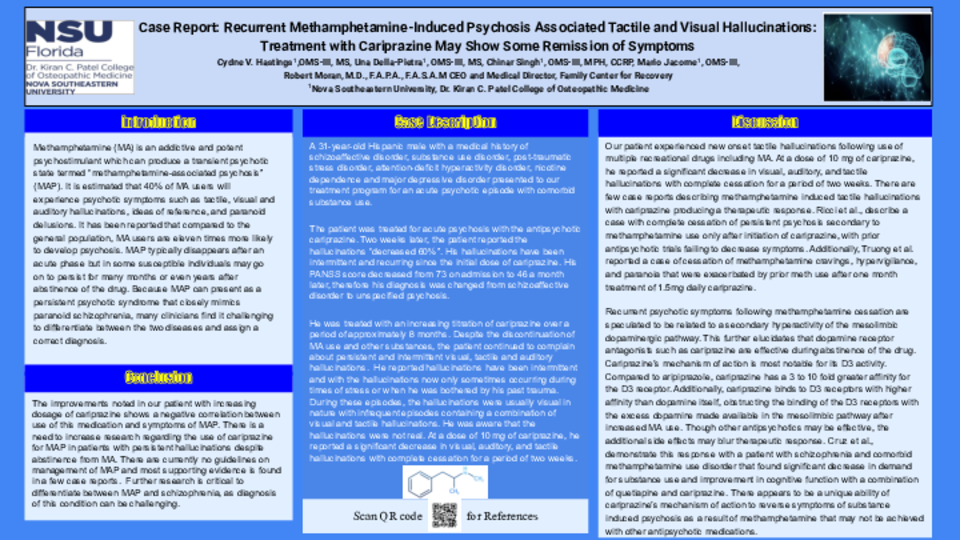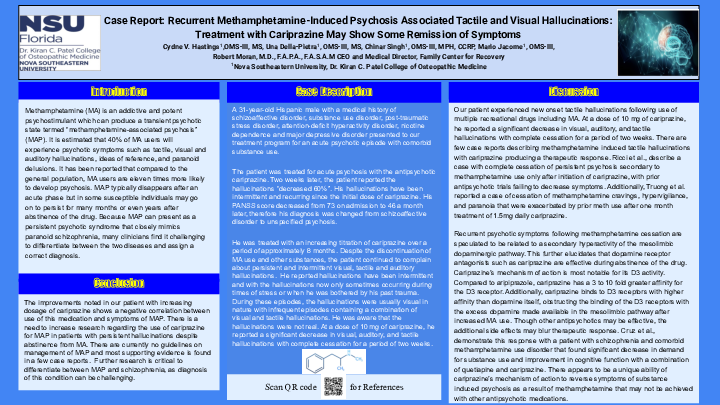Abstract
Introduction: Methamphetamine (MA) is a highly lipophilic molecule that penetrates the blood-brain-barrier and alters noradrenergic, serotonergic and dopaminergic pathways. Dopamine acts on the Central Nervous System (CNS) via three pathways, namely the mesolimbic, the mesocortical and the nigrostriatal pathways. MA is typically associated with dopaminergic neurotransmission involving the mesocorticolimbic pathway. With repeated use of MA, the release of dopamine in the mesolimbic pathway increases, in turn, leading to reinforcement of behavior. MA, being an addictive and potent psychostimulant, can produce a transient psychotic state termed “methamphetamine-associated psychosis” (MAP). It is estimated that 40% of MA users will experience psychotic symptoms such as tactile, visual and auditory hallucinations, ideas of reference, and paranoid delusions. It has been reported that compared to the general population, MA users are eleven times more likely to develop psychosis. MAP typically disappears after an acute phase but in some susceptible individuals may go on to persist for many months or even years after abstinence of the drug. Because MAP can present as a persistent psychotic syndrome that closely mimics Paranoid Schizophrenia, many clinicians find it challenging to differentiate between the two diseases and assign a correct diagnosis.
Case Description: We present a case of a 31-year-old Hispanic male with a medical history of unspecified psychosis, substance use disorder, post-traumatic stress disorder, attention-deficit hyperactivity disorder, nicotine dependence and major depressive disorder presented to our treatment program for an acute psychotic episode with comorbid substance use. The patient was treated for acute psychosis with the antipsychotic Cariprazine. Two weeks later, the patient reported the hallucinations “decreased 60%”. He further reported he had been hallucination free for the first time since his childhood onset of hallucinations. His hallucinations have been intermittent and recurring since the initial dose of Cariprazine. His PANSS score decreased from 73 on admission to 46 a month later, therefore his diagnosis was changed from Schizoaffective disorder to Unspecified Psychosis not due to a substance or known physiological condition. He was treated with an increasing titration of Cariprazine over a period of approximately 8 months. Despite the discontinuation of MA use and other substances, the patient continued to complain about persistent and intermittent visual, tactile and auditory hallucinations. He reported hallucinations have been intermittent and with the hallucinations now only sometimes occurring during times of stress or when he was bothered by his past trauma. During these episodes, the hallucinations were usually visual in nature with infrequent episodes containing a combination of visual and tactile hallucinations. He was aware that the hallucinations were not real. At a dose of 10 mg of Cariprazine, he reported a significant decrease in visual, auditory, and tactile hallucinations with complete cessation for a period of two weeks.
Discussion: The case illustrates the importance of Cariprazine’s use in methamphetamine-induced psychosis.






